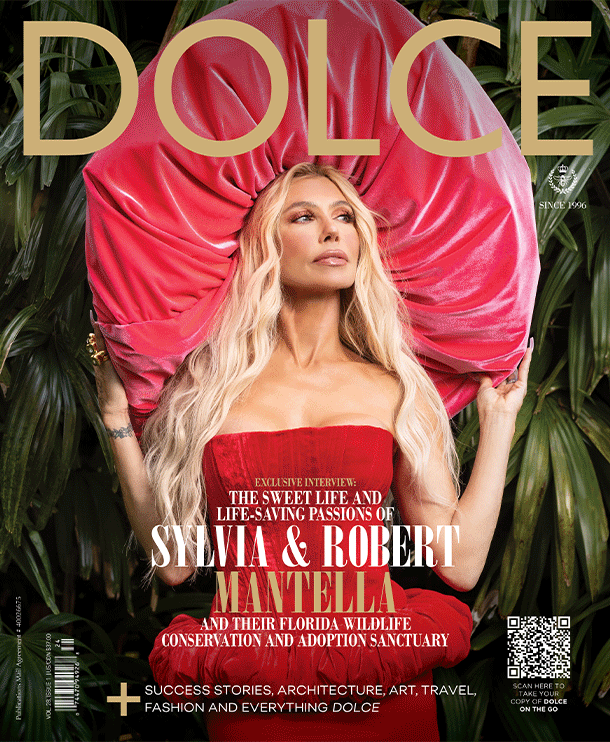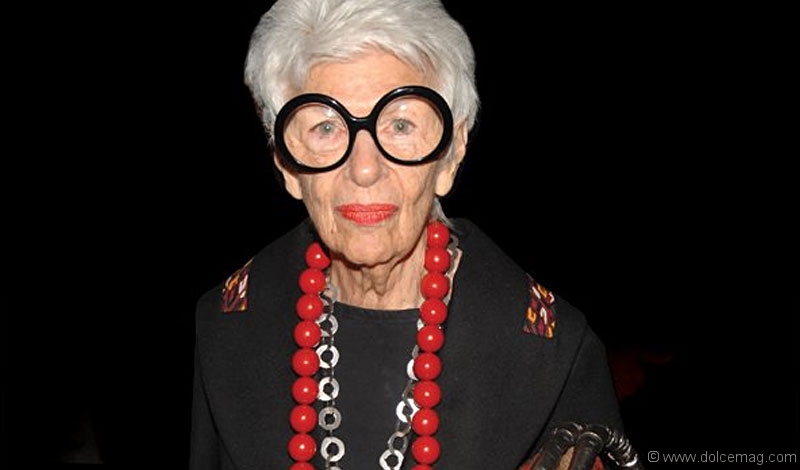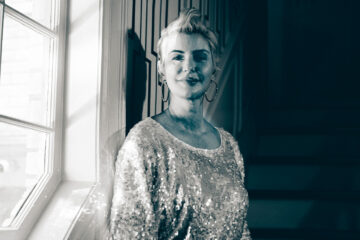Fashion Icon Iris Apfel
It was about halfway through our interview on a rainy Thursday morning when Iris Apfel asks if I would mind pausing while she grabs something quick to eat. She politely explains that a frantic morning had consumed any free time for food. Denying the 90-year-old former interior design and fashion icon a snack would simply be inexcusable, so I hastily oblige. In between bites of goat cheese and raisin bread, she details her day thus far, which includes a lengthy phone call with acclaimed fashion designer Oscar de la Renta. Wait. The Oscar de la Renta? “He wants to borrow some of my Spanish clothes for an exhibition that he’s doing,” she replies passively.
That’s just the world Iris Apfel so gracefully inhabits these days. Between phone calls with global fashion icons, book signings and gearing up for the September launch of her Home Shopping Network line, its incredible that the eclectically clad fashionista finds time. But what else would you expect from a woman who’s been thrust into the global spotlight with her own exhibition at New York’s Metropolitan Museum of Art in 2005, her wardrobe immortalized by photographer Eric Boman in Rare Bird of Fashion: The Irreverent Iris Apfel, (Thames & Hudson, 2007); and is the subject of an upcoming Albert Maysles documentary?
As the rain continues to pour, our conversation flows. Interestingly enough, it was her 90th birthday only a few days before. That’s right; at an age where most would be confined to a Floridian retirement community this “rare bird” still struts with plenty of spring in her step. “The best thing is I don’t have to worry about how I look in a bikini,” she jests, but earnestly adds, “I don’t think being old should be hidden, it’s a blessing, you should celebrate it, and just because a number arrives doesn’t mean you have to lie down and roll over.”
And she certainly isn’t. With her enormous, iconic, owl-eye spectacles, she’s on the verge of launching an “inexpensive” line for the Home Shopping Network, featuring accessories of big, bold and bright colours ideal for everyday use. “I wanted people of Middle America, or those who couldn’t afford too much, to partake in something that was a little big different, usually reserved for people who can afford it.”
A second project she’s exceptionally excited for has Apfel bringing her no-holds-bar sense of panache to Yoox.com this October. A multi-coloured explosion of colours and styles decorate this line’s three categories, ranging from ready-to-wear to exclusive high-end, to pieces from her personal collection. Apfel explains that this venture is “a bit offbeat, everything is very simplified, it’s very organic, it’s very graphic, it’s large, it’s bold, it’s primarily made of natural materials and I think it makes quite a statement.”
Holly Brubach, former fashion writer for The New Yorker and a creative consultant for Yoox.com, feels fashion lovers should keep their eyes out for several of Apfel’s striking pieces, which include a 15-strand necklace made from small black kamagong wood beads, Buddha earrings and rhinestone flower cuffs.
“She has the eye of a connoisseur and the irreverence of a teenager,” says Brubach. “Iris is an inspiration and counts among her fans designers as diverse as Dries Van Noten and Ralph Lauren. In a field that idolizes youth and beauty, she reminds us that age is irrelevant where style is concerned, and the best fashion objective is not participating in a trend but becoming yourself.”
If there’s one individual who knows what it’s like to make a statement with flair, it’s Iris. Her residence is a museum of timeless beauty that houses everything from antique furniture to flea market knick-knacks and 17th century masterpiece paintings. Donning unapologetic, eye-catching attire that would put a Jackson Pollock painting to shame, Apfel embodies the very essence of style, breaking the preordained confines the fashion industry shapes. “To me, what something costs or who made it has never meant anything – I just buy anything that looks good to me and I like. I trust my own intuition and my own taste. I just trust myself,” she says, while also explaining how her influential mother, who helped pioneer costume jewelry, taught her the value of accessorizing from a young age. “She always preached the gospel of the little black dress and lots of accessories – you can change everything around and turn one dress into a hundred outfits.”
This appreciation for detail was part of the reason why her and her husband’s company, Old World Weavers, was commissioned to restore the interior fabric of the White House, completing most of the work during the Nixon administration. Apfel, however, feels the most stylish American president was Ronald Regan. “Besides from his clothes being impeccable, he knew how to carry them, and he always looked appropriate … Ronald Regan had style,” she explains.
Like a chic philosopher, Apfel confidently walks beyond the boundaries of dictated dress, observing with unhindered vision that if fashion is meant to be a conduit for self-expression and style is a reflection of who we are, why are we letting others decree what we should wear? “I think people are fearful,” Apfel explains. “There’s a tremendous heard mentality. Everybody says they want to be different but they’re afraid to do it. A lot of it is because they don’t know how.”
A point she expounds with a tale from a book signing in Palm Beach. A local dealer had approached Apfel and graciously thanked her for changing her life. The sentiment seemed rather odd to Apfel: how could she possibly affect someone’s life by simply wearing clothes? But as the dealer explained, she was always afraid of looking like a “freak” and instead “slavishly followed the crowd”. Thanks to Iris, however, she realized that by not having to look like everybody else she didn’t have to think like everybody else, either. And for Apfel, not thinking for yourself is a big no-no. “I think the biggest fashion faux pas is looking in the mirror and seeing someone else.”
“I think people dress either who they think they are or who they would want to be. Many people are wannabes,” she adds. “You say a lot about who you are or who you would like to be by the way you dress.”
That is just the fearless mentality this queen of creativity embraces. She still recalls her days at the University of Wisconsin, where she made fashionably progressive strides by wearing jeans – something conventional by today’s standards, but in the 1940s was quite the revolution. She ventured to an army surplus store in search of the elusive denim, but they refused to sell her any because they were made exclusively for men. “I don’t care if [women] don’t wear them, I want a pair,” she protested. After weeks of pestering, and being literally thrown out, they finally conceded and ordered her a pair – you better believe she wore them with pride.
Being proud of her looks has always been something Iris ascribes to. More than comfortable in her venerable skin, she is appalled at modern women who fruitlessly obsess over maintaining a 20-year-old’s figure. “Wasn’t it Chanel that said, ‘Nothing makes a woman look so old than trying desperately to look young?’” Acknowledging that plastic surgery seems to be a “way of life,” Apfel just laughs at the insincerity that accompanies the physically altering procedures of modern surgery. As she notes, “I think if people put something inside their heads instead of outside their heads they would be much better off.”
And while she’s had access to a senior’s bus pass for decades, her insight for the contemporary world doesn’t just end with facelifts. She’s very much attuned to the disconnect created by our wireless devices. While we may celebrate the increased connectivity of our smartphones and tablets, Apfel is wary of its affects on social organization. “It’s like the cellphone has replaced one of your sensory organs. These kids are like attached to their machines. I just think technology is a wonderful thing, but it can be carried to an extreme,” she says, adding much of today’s youth lack “personal curiosity” – a trait she used throughout her life to explore and experience the world around her, and not just read about it on a Wikipedia page.
It’s incredible to think what today’s generation could learn from this woman. She understands the blessing and the curse created by our society’s accessibility to everything. Today’s wired generation has the world at its fingertips, but too much is readily available. Apfel feels, “Things are made too easy, and it’s not good. I mean you have to knock yourself out a little bit to understand something.” Instead of obsessing over the debutants and dilatants glamorized on prime-time television, up-and-comers should be concerned with working from the bottom. “Most of the young people I know want to start at the top, I mean they’ll play at being an intern, but they don’t want to get their hands dirty.”
Although the day started dreary, Apfel brought some much-needed colour. Her lust for life is an inspiration not just for the fashionable, but for all longing to embrace that childlike whimsy within. Even at her age, she’s still eager to experience the world and live every day to its fullest, as she concludes, “la dolce vita implies, I think, it implies sensuality, I don’t mean sensuality as in jumping in and out of the sack. I mean eating well, smelling good things, looking at beautiful things, touching, feeling, all those things, being sensual is a very important part of living. I think if you’re not you’re like a robot.”




















































































No Comment